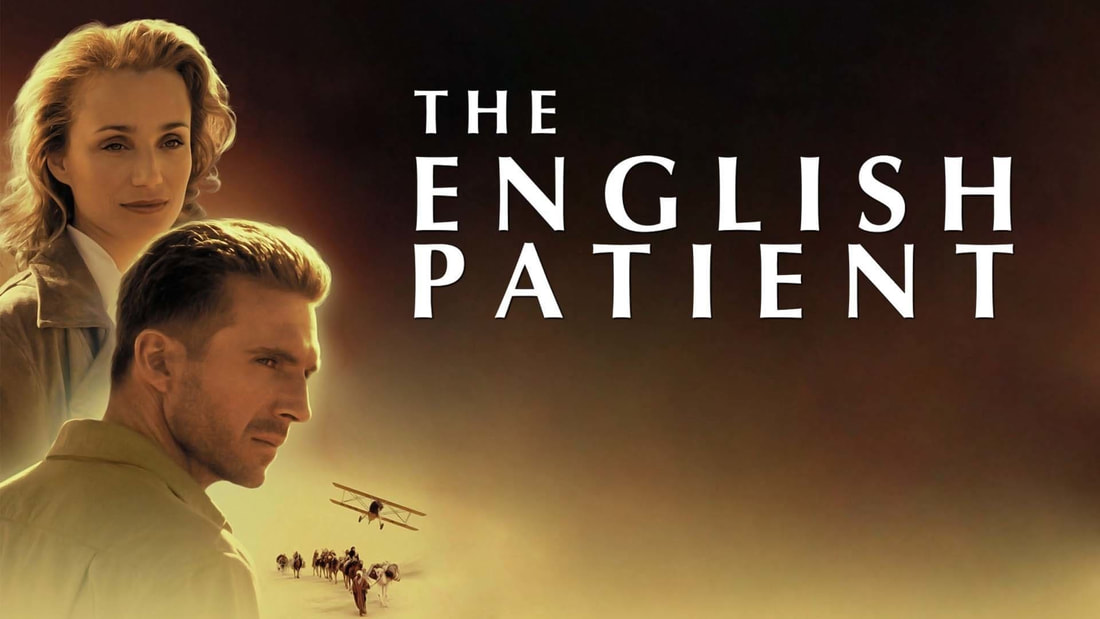Based on Michael Ondaatje's 1992 novel of the same name, The English Patient follows four dissimilar people who have been brought together at an Italian villa during the Italian Campaign of World War II. They are an unrecognisably burned man (Ralph Fiennes), his French-Canadian Army nurse (Juliette Binoche), a Sikh British Army sapper (Naveen Andrews), and a Canadian Intelligence Corps operative (Willem Dafoe). The story takes place during the North African Campaign and centers on the incremental revelations of the patient's actions prior to his injuries, and the emotional effects of these revelations on the other characters. Which includes a love affair he had with a married woman (Kristin Scott Thomas).
When producer Saul Zaentz met with Anthony Minghella about working together after the former saw the director's 1990 British fantasy drama, Truly, Madly, Deeply, the latter brought the novel to his attention. Minghella had read it in one sitting after completing a previous shoot in New York City. When he finished the novel, he was completely disoriented and at first couldn't remember where he was. Saul Zaentz not only read it, but he discovered that author Michael Ondaatje was giving a reading near Zaentz's home that weekend. This project was originally set up at 20th Century Fox, but the studio wanted the insurance policy of bigger actors at the time. They especially wanted Demi Moore to play Katharine Clifton, who was even lobbying hard for the role. When the filmmakers refused to give in on a series of casting choices, Fox backed out of the movie just as production was about to begin. Though within a few weeks (during which the cast and crew stayed in Italy not knowing if they were going to move forward or not), Miramax picked it up, and the filmmakers were allowed to cast their own personal preference of Kristin Scott Thomas as Katharine.
After having began a limited release about three weeks earlier, The English Patient was released in movie theaters nationwide on December 6th, 1996. On a budget that ranged from $27-31,000,000, it was able to gross over $232,000,000 at the worldwide box office. On March 24th, 1997, the film ended up winning 9 Academy Awards for Best Picture, Best Director (Anthony Minghella), Best Supporting Actress (Juliette Binoche), Best Art Direction, Best Costume Design, Best Cinematography, Best Film Editing (making this the first digitally edited movie to have won here), Best Sound, and Best Original Dramatic Score. The only three awards it didn’t win were Best Actor (Ralph Fiennes lost to Geoffrey Rush for Shine), Best Actress (Kristin Scott Thomas lost to Frances McDormand for Fargo), and Best Adapted Screenplay (Anthony Minghella lost to Billy Bob Thornton for Sling Blade).
After having began a limited release about three weeks earlier, The English Patient was released in movie theaters nationwide on December 6th, 1996. On a budget that ranged from $27-31,000,000, it was able to gross over $232,000,000 at the worldwide box office. On March 24th, 1997, the film ended up winning 9 Academy Awards for Best Picture, Best Director (Anthony Minghella), Best Supporting Actress (Juliette Binoche), Best Art Direction, Best Costume Design, Best Cinematography, Best Film Editing (making this the first digitally edited movie to have won here), Best Sound, and Best Original Dramatic Score. The only three awards it didn’t win were Best Actor (Ralph Fiennes lost to Geoffrey Rush for Shine), Best Actress (Kristin Scott Thomas lost to Frances McDormand for Fargo), and Best Adapted Screenplay (Anthony Minghella lost to Billy Bob Thornton for Sling Blade).
Nowadays, The English Patient is kind of seen as one of the more second tier Best Picture winners with a number of people preferring a couple of its competitors from that year such as Fargo and Jerry Maguire. Although it was most famously referenced in an episode of Seinfeld where Julia Louis-Dreyfus’ character, Elaine, went to see the film. She hated it so much, that she at one point in the middle of the screening shouted “Just die already!”. Though nonetheless, The English Patient is still viewed as a classic in its own right.
